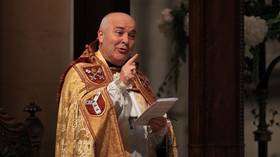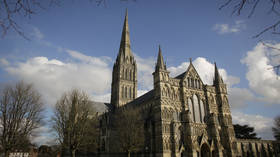‘Our Father’ is problematic, English state church leader claims

The first line of the Lord’s Prayer is “problematic” as it describes God as “our father,” the Archbishop of York told a meeting of Protestant clergy on Friday. A liberal faction within the Church of England has recently been pushing senior leaders to drop “gendered language.”
In an address to the church’s General Synod, Archbishop Stephen Cottrell recited the Lord’s Prayer, but paused to remark on the words “Our Father” that open the 2,000-year-old invocation.
“I know the word ‘father’ is problematic for those whose experience of earthly fathers has been destructive and abusive, and for all of us who have laboured rather too much from an oppressively patriarchal grip on life,” he said, according to The Guardian.
Cottrell did not elaborate on whether he felt the prayer’s wording should be changed, but his comment divided members of the Synod, which is the Church of England’s governing body.
“Is the Archbishop of York saying Jesus was wrong, or that Jesus was not pastorally aware?” asked Canon Dr. Chris Sugden of the conservative Anglican Mainstream group, referring to the fact that both the Gospels of Matthew and Luke recount the prayer being taught directly by Jesus Christ to his disciples.
Rev. Christina Rees, a former General Synod member, agreed that calling God “Our Father” is “hugely problematic.”
“Because Jesus called God ‘daddy’, we think we have to call God ‘daddy’,” she said “And the big question is, do we really believe God believes that male human beings bear the image of God more fully and accurately than women? The answer is absolutely not.”
The debate is illustrative of a growing divide within the Church of England, whose liberal members have sought to reinvent the institution’s image amid dwindling attendance and church closures. Earlier this year, the church’s Liturgical Commission – which sets out how mass is performed and what kind of language is used during services – told a meeting of the General Synod that it has “been exploring the use of gendered language in relation to God for several years.”
The meeting was followed by a contentious vote on same-sex unions, in which the church agreed it would bless, but not marry, gay couples. The compromise angered both conservative and liberal factions, with the former viewing the decision as blasphemous and the latter arguing that it did not go far enough. The Synod is set to debate how to carry out these blessings on Saturday, and how to handle clergy who refuse to participate.













